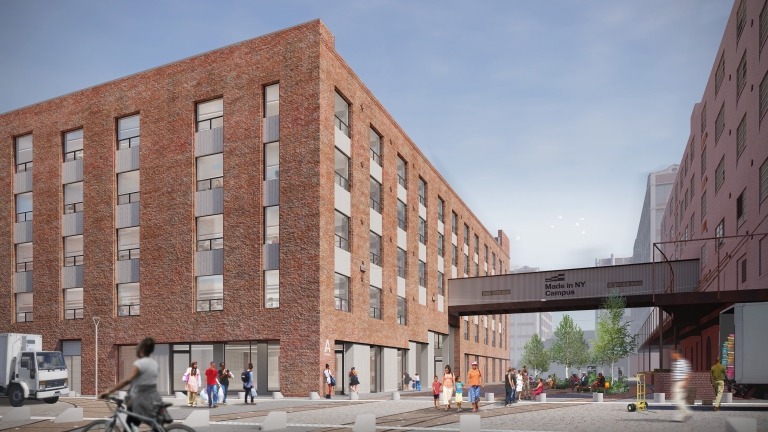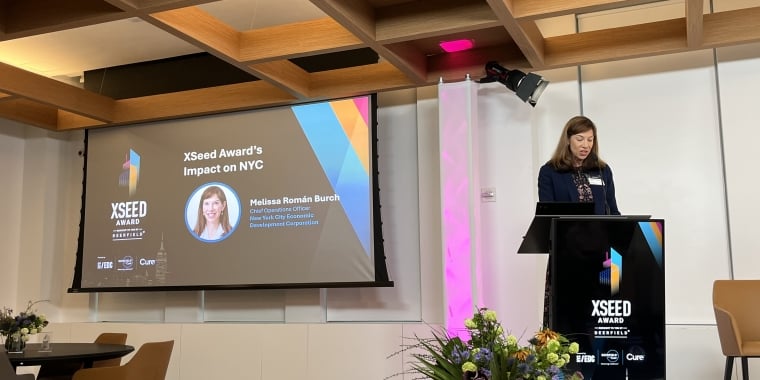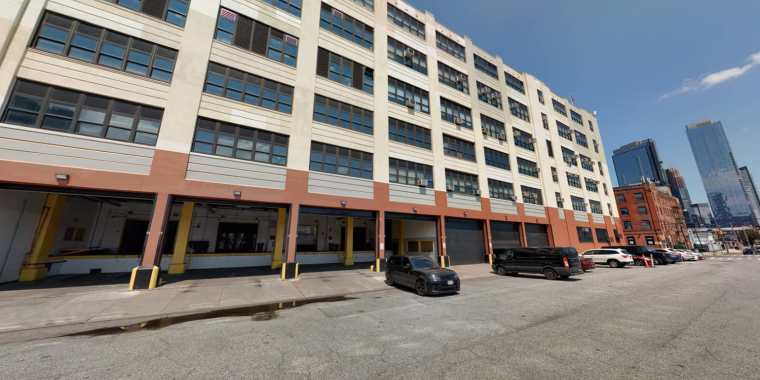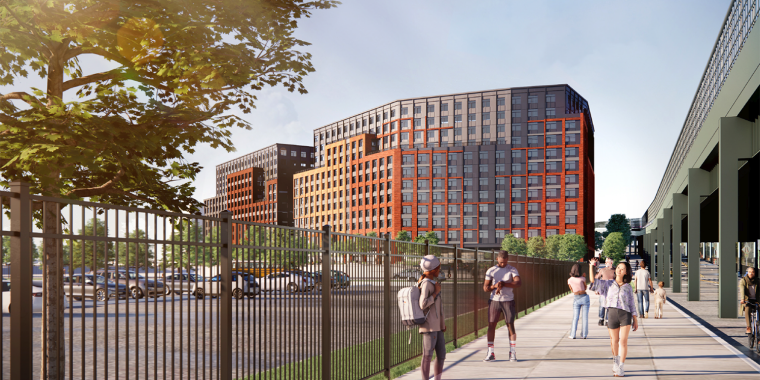Mayor Adams Celebrates New York Fashion Week by Announcing Creation of Sustainable Fashion Jobs in Brooklyn

Slow Factory Will Become First Major Tenant at Made in NY Garment Hub in Sunset Park as Part of Redevelopment
Made in NY Garment Hub Expected to Create More Than 460 Fashion Jobs In NYC, Provide Estimated Economic Output of $57 Million
BROOKLYN, NY—As New York celebrates New York Fashion Week, New York City Mayor Eric Adams announced a partnership with New York City Economic Development Corporation (NYCEDC) that will create new jobs for New Yorkers, expand Brooklyn’s footprint in the fashion industry, and provide a boost to New York’s economy. As part of the redevelopment of the Made in New York (MiNY) Campus at Bush Terminal in Sunset Park, Slow Factory will join the MiNY Garment Manufacturing Hub as the first anchor tenant. The MiNY Garment Hub will serve as a space to grow jobs and expand workforce training in garment manufacturing, fashion design, and other affiliated businesses. Additionally, the Garment Hub will create 460 fashion jobs onsite and train 500 people — bringing in an estimated $57 million in direct economic output to New York City.
“New York City was already the fashion capital of the United States, but the redevelopment and creation of new fashion jobs at the Made in NY Campus in Brooklyn will only solidify our place as the city of swagger,” said Mayor Eric Adams. “Slow Factory’s opening at the Garment Hub in Sunset Park will help create hundreds of fashion jobs onsite and bring tens of millions of dollars of direct economic output to New York City. Additionally, in New York, we are leading the way and showing that prioritizing sustainability can go hand-in-hand with the fashion industry.”
“New York City is the fashion capital of the world, and the Made in New York Campus reflects the Adams administration’s commitment to make sure we remain that way,” said Deputy Mayor for Economic and Workforce Development Maria Torres- Springer. “Congratulations to Slow Factory for being the first anchor tenant. Their work at the intersection of sustainable garment production and supportive workforce development practices is a model for fashion manufacturing that reflects our city’s values.”
Slow Factory’s move into the Garment Hub will not only be its first ever brick and mortar location, but the move will build upon a thriving manufacturing sector in Sunset Park. Frontline climate justice leadership has long called for a focus on sustainability and green manufacturing in the district, home to the second largest concentration of garment manufacturers and employment in New York City. Slow Factory will establish a dedicated multidisciplinary institute, which will deliver educational programming and workforce training, a product studio, and a research and development lab all under one roof.
The institute will provide a physical home to the Slow Factory’s “Open Edu” program, a free and accessible education series on climate justice, climate solutions, and climate-positive design. The programming will be integrated with Slow Factory Labs, a physical manufacturing facility for regenerative material innovation that focuses on their plant-based leather, Slowhide.
“Reducing fashion’s carbon footprint is not only trendsetting, but necessary in the fight against climate change,” said NYCEDC President and CEO Rachel Loeb. “Slow Factory will build on Sunset Park’s strong foundation of garment manufacturing and green innovation with cutting edge solutions and meaningful workforce development that puts New York City on a path to strengthen, grow, and change the manufacturing industry for the better.”
“This school presents a revolutionary opportunity to offer a pragmatic, future-oriented curriculum in Sunset Park, Brooklyn,” said Slow Factory Executive Director Céline Semaan. “We are working diligently to fill a critical educational gap that focuses on climate justice and human rights, while creating a community hub for education and skills training.”
Other waste-to-resource training programs will focus on design for disassembly that allow designers to work from thousands of pounds of discarded clothes, returned goods, and textile waste delivered to the Slow Factory through their brand partners. Slow Factory also plans to open the Slow Factory Institute, which aims to leverage its climate-positive education and training programs to stimulate sustainable economic development and pathways to skilled employment opportunities in historically marginalized communities. Opening an institute is the first milestone in the organization’s larger plan to develop a network of climate institutes around the world.
Housing these offerings under one roof will allow Slow Factory to create a new, replicable model for a regenerative global supply chain grounded in sustainable community economic development.
Sunset Park residents will additionally have free access to all programming and events, including youth-oriented climate adaptation events and waste-led design workshops focused on skills training.
“Sunset Park is an environmental justice community to its core and that is why it is so important to have Slow Factory’s focus on sustainable fashion and racial equity lead the Garment Manufacturing Hub,” said U.S. Representative Nydia M. Velazquez. “The path to reducing climate change runs straight through neighborhoods like Sunset Park, and the Garment Hub ought to stand as a model for communities across the country to create sustainable products, while empowering residents to be a part of this change through meaningful workforce development and empowerment.”
“I am thrilled to see that the Garment Manufacturing Hub will be welcoming its first tenant in the Made in New York Campus in Sunset Park,” said Congressman Jerrold Nadler. “The Garment Hub will help train the next generation of workers and help create jobs for New Yorkers. I look forward to seeing this project reach out to the community for job training and workforce development, and I fully support these efforts.”
“We welcome Slow Factory to District 38 and support their mission to use fashion as an instrument for social, cultural, and environmental change,” said Council Member Alexa Aviles. “Our district has a long history in these fields, and we hope their arrival will support and help sustain these efforts in the years to come. We expect to work closely with Slow Factory and all partners to create career pathways that connect residents to jobs on our working waterfront, for local residents and especially youth of color that extends all the way into leadership roles. Bienvenidos!”
“SBIDC is thrilled to welcome Slow Factory to the industrial working waterfront in Sunset Park," said Southwest Brooklyn Industrial Development Corporation Executive Director Jesse Solomon. “As the first anchor tenant in the Made in New York Campus, Slow Factory will set an important precedent for bringing businesses with a focus on sustainability to the Made in New York Campus. This new Garment Hub will create much needed state-of-the-art space for local manufacturing companies and host hundreds of jobs in Sunset Park. SBIDC looks forward to working with Slow Factory and other incoming businesses, helping them hire locally and contribute to an equitable economic development strategy in Brooklyn.”
The MiNY Campus is being constructed by Gilbane Development Company, which has a proven track record of using New York City-certified Minority- and Women-Owned Business Enterprise (M/WBE) subcontractors and suppliers. Currently, M/WBE participation for the campus is at 60 percent. The garment hub will include state-of-the-art manufacturing workspaces — ranging from 2,000 to 40,000 square feet for local, Brooklyn-based companies — as well as other manufacturing companies.
The Garment Hub is expected to be complete before the end of this year. Business owners can visit edc.nyc/MiNYGarmentHub to lease space and learn more.
About New York City Economic Development Corporation (NYCEDC)
New York City Economic Development Corporation creates shared prosperity across New York City’s five boroughs by strengthening neighborhoods and creating good jobs. NYCEDC works with and for communities to provide them with the resources they need to thrive, and we invest in projects that increase sustainability, support job growth, develop talent, and spark innovation to strengthen the City’s competitive advantage. To learn more about our work and initiatives, please visit us on Facebook, Twitter, LinkedIn, and Instagram.
About Slow Factory
Slow Factory transforms socially and environmentally harmful systems by designing models that are good for the Earth and good for people. We are people of the global majority advancing climate justice and social equity through regenerative design, open education, and materials innovation. We envision a society that holds interdependence between people and nature as its highest value and liberation as a collective responsibility. In an era defined by climate catastrophe, we recognize the urgent imperative to redesign all human activity. Our methodology applies ancestral wisdom to scientific and technological innovation to turn segregated systems into holistic ecosystems. We embrace plurality to decentralize solutions that repair and nurture global-majority communities impacted by colonialism. Understanding that culture is a powerful driver for policy and corporate practice, we collaborate with partners across fashion, media, business, and civil society to build an equitable, climate-positive society. Together, we drive systemic change defined by a regenerative ethos, transparent supply chains, and rigorous analysis of material life cycles. Visit our website, Instagram or Twitter.


